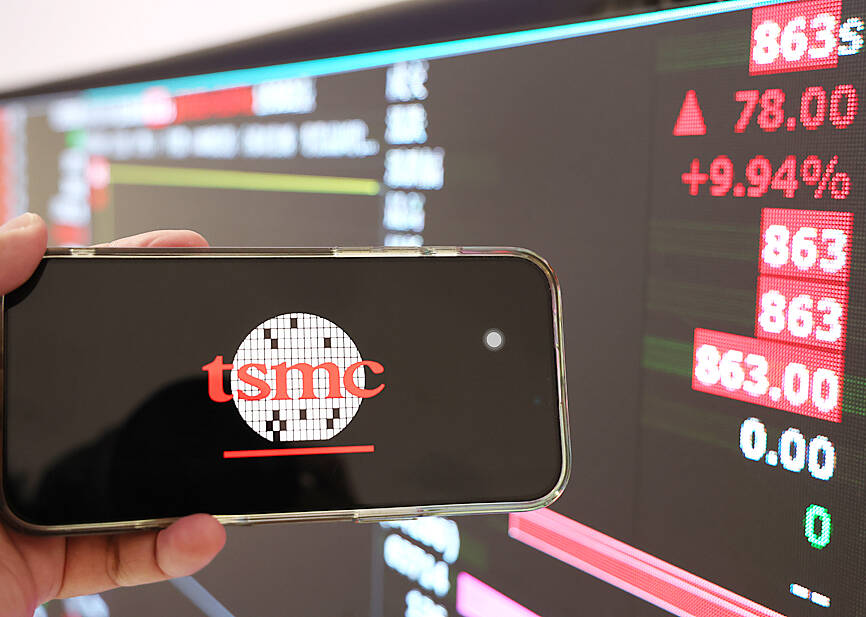Taiwan Semiconductor Manufacturing Co’s (TSMC, 台積電) quarterly revenue rose a larger-than-anticipated 41.6 percent from a year earlier, reflecting strengthening demand for artificial intelligence (AI) servers and smartphones before US tariffs kicked in.
That marked TSMC’s fastest pace of growth since 2022. Electronics manufacturers had stockpiled goods in US warehouses in anticipation of potential trade and shipping disruptions.
The main chipmaker for Apple Inc and Nvidia Corp yesterday reported revenue of NT$839.25 billion (US$25.5 billion) in the first three months of this year. Analysts on average expected roughly NT$830.5 billion.

Photo: CNA
Last month alone, TSMC’s revenue was NT$285.96 billion, up 46.5 percent from a year earlier and a record high in the company’s history.
The company is to report full quarterly earnings on Thursday next week, along with its outlook for the current quarter.
US President Donald Trump’s 90-day pause on higher tariffs might mean more stockpiling in the months ahead, shoring up TSMC’s June quarter, according to Bernstein analysts led by Mark Li.
“We think AI demand, despite some recent noises, will still grow notably year-on-year,” they said in a note to investors.
Shares of TSMC closed up 9.94 percent in Taipei trading yesterday.
TSMC’s results coincide with growing concerns about how tariffs may disrupt demand for electronics such as iPhones. Over the weekend, Americans rushed to pick up Apple’s marquee device, fearing it may raise prices to cover the additional cost.
Some analysts said TSMC might have to cut its full-year revenue target for growth in the mid-20 percent range, reflecting global uncertainty and the potential hit to economies. The company’s outlook is overshadowed also by Trump’s threats to slap tariffs on semiconductor imports, although it is unclear when or whether that might happen.
Still, TSMC remains the world’s leader in the production of advanced semiconductors used for AI devices and smartphones. That could cushion the impact of tariffs or trade disruptions.

South Korea’s equity benchmark yesterday crossed a new milestone just a month after surpassing the once-unthinkable 5,000 mark as surging global memory demand powers the country’s biggest chipmakers. The KOSPI advanced as much as 2.6 percent to a record 6,123, with Samsung Electronics Co and SK Hynix Inc each gaining more than 2 percent. With the benchmark now up 45 percent this year, South Korea’s stock market capitalization has also moved past France’s, following last month’s overtaking of Germany’s. Long overlooked by foreign funds, despite being undervalued, South Korean stocks have now emerged as clear winners in the global market. The so-called “artificial intelligence

NEW IDENTITY: Known for its software, India has expanded into hardware, with its semiconductor industry growing from US$38bn in 2023 to US$45bn to US$50bn India on Saturday inaugurated its first semiconductor assembly and test facility, a milestone in the government’s push to reduce dependence on foreign chipmakers and stake a claim in a sector dominated by China. Indian Prime Minister Narendra Modi opened US firm Micron Technology Inc’s semiconductor assembly, test and packaging unit in his home state of Gujarat, hailing the “dawn of a new era” for India’s technology ambitions. “When young Indians look back in the future, they will see this decade as the turning point in our tech future,” Modi told the event, which was broadcast on his YouTube channel. The plant would convert

‘SEISMIC SHIFT’: The researcher forecast there would be about 1.1 billion mobile shipments this year, down from 1.26 billion the prior year and erasing years of gains The global smartphone market is expected to contract 12.9 percent this year due to the unprecedented memorychip shortage, marking “a crisis like no other,” researcher International Data Corp (IDC) said. The new forecast, a dramatic revision down from earlier estimates, gives the latest accounting of the ongoing memory crunch that is affecting every corner of the electronics industry. The demand for advanced memory to power artificial intelligence (AI) tasks has drained global supply until well into next year and jeopardizes the business model of many smartphone makers. IDC forecast about 1.1 billion mobile shipments this year, down from 1.26 billion the prior

People stand in a Pokemon store in Tokyo on Thursday. One of the world highest-grossing franchises is celebrated its 30th anniversary yesterday.